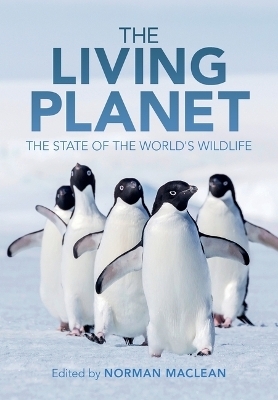
The Living Planet
Cambridge University Press (Verlag)
978-1-108-73165-2 (ISBN)
Since 1970, there has been an overall decline in wildlife populations in the order of 52%. Freshwater species populations have declined by 76%; species populations in Central and South America have declined by 83%; and in the Indo-Pacific by 67%. These are often not complete extinctions, but large declines in the numbers of animals in each species, as well as habitat loss. This presents us with a tremendous opportunity, before it is too late to rescue many species. This book documents the present state of wildlife on a global scale, using a taxonomic approach, and serving as a one stop place for people involved in conservation to be able to find out what is in decline, and the success stories that have occurred to bring back species from the brink of extinction - primarily due to conservation management techniques - as models for what we might achieve in the future.
Norman Maclean is Emeritus Professor of Biology at the University of Southampton and a lifelong wildlife enthusiast. He has visited and studied wildlife in more than fifty countries around the world and has given numerous radio and TV interviews on the subject. He is the editor of Silent Summer (Cambridge, 2010); co-editor of Austral Ark (with Adam Stowe and Greg Holwell, Cambridge, 2015); and author of A Less Green and Pleasant Land (Cambridge, 2015).
1. Introduction and the evolution of life on earth Norman Maclean; 2. Flowering plants Sara Oldfield and Lauren Gardiner; 3. Bryophytes and Pteridophytes; Spore-bearing land plants Mary Gibby; 4. Terrestrial mammals Alexis M. Mychajliw; 5. Marine mammals: exploited for millennia, but still holding on Alexis M. Mychajliw and Thomas A. Jefferson; 6. Birds Tristram Allinson; 7. Reptiles Philip Bowles; 8. Amphibians Phillip J. Bishop † , Sally Wren, Ariadne Angulo and Richard A. Griffiths; 9. Freshwater fishes: threatened species and threatened waters on a global scale Peter B. Moyle and Robert A. Leidy; 10. The amazing yet threatened world of marine fishes Mark A. Hixon and Brian W. Bowen; 11. Insects Manu E. Saunders, Simon Leather †, Jenni Stockan and David Yeates; 12. Marine invertebrates Alex David Rogers, Patricia Miloslavich, David Obura and Octavio Aburto-Oropreza; 13. Non-insect terrestrial arthropods Gonzalo Giribet; 14. Terrestrial invertebrates other than arthropods and molluscs Gonzalo Giribet; 15. Non-marine Molluscs Robert H. Cowie, Benoît Fontaine and Philippe Bouchet; 16. An account of the diversity and conservation of fungi and their close relatives Gregory Mueller and Jessica L. Allen; 17. Simple life forms Norman Maclean; 18. Assessing species conservation status: the IUCN red list and green status Molly Grace; 19. Problems with the world`s ecosystems Matt W. Hayward; 20. Conservation methods and successes Norman Maclean; 21. What does the future hold for our planet and its wildlife? Norman Maclean; Index.
| Erscheinungsdatum | 03.04.2023 |
|---|---|
| Zusatzinfo | Worked examples or Exercises |
| Verlagsort | Cambridge |
| Sprache | englisch |
| Maße | 169 x 243 mm |
| Gewicht | 730 g |
| Themenwelt | Naturwissenschaften ► Biologie ► Ökologie / Naturschutz |
| Naturwissenschaften ► Biologie ► Zoologie | |
| ISBN-10 | 1-108-73165-1 / 1108731651 |
| ISBN-13 | 978-1-108-73165-2 / 9781108731652 |
| Zustand | Neuware |
| Haben Sie eine Frage zum Produkt? |
aus dem Bereich


